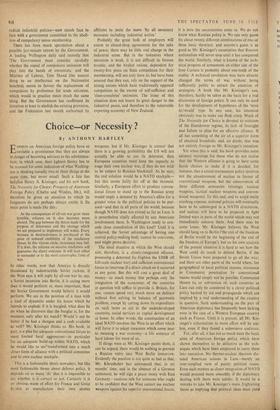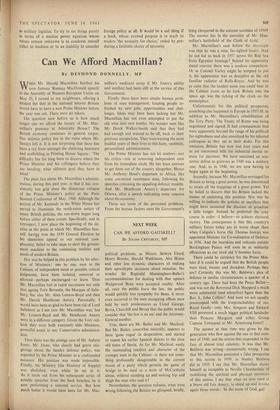Choice or Necessity?
By ANTHONY HARTLEY XPERTS on American foreign policy have so Li enviable a prominence that they arc always in danger of becoming advisers to the administra- tion; in which case, their lightest theory has to be scanned for some indication of what Washing- ton is thinking (usually two or three things at the same time, but never mind) Such a fate has befallen Henry A. Kissinger, and his new book, The Necessity for Choice: Prospects of American Foreign Policy (Chatto and Windus, 30s.), will therefore be given an attention to which its longueurs do not perhaps always entitle it. Its main point is made like this: As the consequences of all-out war grow more horrible, reliance on it also becomes more absurd. The gap between the threat made for the purpose of deterrence and the strategy which we are prepared to implement will widen. Every increase in destructiveness is purchased at the price of reduced credibility of the retaliatory threat. In this vicious circle, deterrence may fail. If it does, the reliance on massive retaliation will guarantee the direct outcome. It will lead either to surrender or to the most catastrophic form of war.
In other words, now that America is directly threatened by indestructible Soviet rockets, if the West says it will reply by all-out war to, say, a Soviet incursion into Berlin, it is saying more than it would perform or, more important, than the Soviet Government would believe it would perform. We are in the position of a man with a load of dynamite under his house which he intends to explode if it is burgled; what does he do when he discovers that the burglar is, for the moment, only after his watch? Would it not be better if he had a shotgun and a cosh available as well? Mr. Kissinger thinks so. His book, in part, is a plea for adequate conventional forces to meet limited local aggressions—in particular for an adequate build-up within NATO, which he would like to see- transformed into a much closer form of alliance with a political committee and its own nuclear stockpile.
This is a fashionable thesis nowadays, but like most fashionable theses about defence policy, it depends on so many 'ifs' that it is impossible to say whether it is correct or not. Certainly it is an obvious waste of effort for France and Great t,..tain to manufacture their own atomic weapons; but if Mr. Kissinger is correct that there is a growing probability the US will not actually be able to use its deterrent, then European countries must keep the capacity to wage their own nuclear war, if they do not wish to be subject to Russian blackmail. As he says, the real solution would be a NATO stockpile— but this seems fairly far off at the moment. Similarly, a European effort to produce conven- tional forces to stand up to the Russian army would imply a demand by America's allies for a greater voice in the political policies to be pur- sued—and that in all parts of the world, because though NATO does not extend as far as Laos. it is nevertheless vitally affected by any American involvement there. Is Washington ready to con- cede close consultation of this kind? Until it is achieved, the Soviet advantage of having one central policy-making body cannot be overcome, and might prove decisive.
The ideal situation at which the West should aim, therefore, is a closely-integrated alliance, possessing a deterrent (to frighten the USSR of full-scale nuclear war) and sufficient conventional forces to intervene if a direct attack on it occurred at any point. But this will cost a great deal of money—so much money that perhaps only the integration of the economies of the countries in question will suffice to provide it. Britain, for one, cannot spend very much more on defence without first solving its balance of payments problem, except by cutting down its expenditure on such items as aid to the underdeveloped countries, social services or capital development at home. In other words, the construction of an ideal NATO involves the West in an effort which will force it to adopt measures which come near to meaning a war economy—a life sentence of hard labour for most of us.
If things were as Mr. Kissinger paints them, it can be argued, there would be nothing to prevent a Russian entry into West Berlin tomorrow. Evidently the position is not quite as bad as that. Mr. Khrushchev has announced that, in six months' time, and in the absence of a German settlement, he will sign a peace treaty with East Germany—cautious talk for someone who ought to be confident that the West cannot use nuclear weapons'against his superior conventional forces. It is here the uncertainties come in. We do not know what Russian policy is. We can only guess (in about twenty different combinations of two or three basic theories); and anyone's guess is as good as Mr. Kissinger's assumption that Russian nationalism will never stop until it has conquered the world. Similarly, what is known of the tech- nical progress of armaments on either side of the Iron Curtain is probably about one-tenth of the reality. A technical revolution may have already changed the terms of war without being sufficiently public to attract the attention of strategists. A book like Mr. Kissinger's can, therefore, hardly be taken as the basis for a real discussion of foreign policy. It can only be used for the development of hypotheses of • the 'were to/would' type. In any case, his intention obviously was to make our flesh creep. Much of The Necessity for Choice is devoted to criticism of the Eisenhower regime, its lack of foresight and failure to plan for an effective alliance. It all has something of the air of a superior form of electoral broadside; and, no doubt, that was not entirely foreign to Mr. Kissinger's intention.
Yet when this is said, his book provides some salutary warnings for those who do not realise that the Western alliance is going to have some harsh choices to make if it is decided, for instance, that a sound rearmament policy involves not the abandonment of nuclear in favour of conventional weapons, but the conservation of three different armouries (strategic nuclear weapons, tactical nuclear weapons, and conven- tional weapons). To this end, and to avoid really crushing expense. national policies will eventually have to be submerged in a NATO directorate, and nations will have to be prepared to light limited wars in parts of the world which may not immediately concern them. And there may be some losses. Mr. Kissinger believes the West should hang on to Berlin (`the end of the freedom of Berlin would be the beginning of the end of the freedom of Europe'), but on his own analysis of the present situation it is hard to see how the West could do much to defend Berlin, if the Soviet Union were prepared to go all the way; and there arc other parts of the world where, for geographical or local political reasons, resistance to Communist penetration by conventional means would simply not be possible. Communist threats to, or subversion of, such countries as Laos can only be countered by a clever political policy backed by aid and propaganda which are inspired by a real understanding of the country in question. Such understanding on the part of American diplomacy has frequently been lacking even in the case of a Western European country such as France. Until it is present, all Mr. Kis- singer's exhortations to more effort will be use- less, even if they found a submissive audience.
For, after all, it has not so much been the basic aims of American foreign policy which have shown themselves to be defective as the tech- niques which have been employed to carry them into execution. No thermo-nuclear theorem dic- tated American actions in Laos—merely an over-simplied view of purely political issues. Even such matters as closer integration of NATO would proceed more smoothly if the diplomacy dealing with them were subtler. It would be a mistake to take Mr. Kissinger's main, frightening thesis as implying that political ideas must yield to military logistics. To try to see things purely in terms of a nuclear power equation whose values remain unknown is to condemn oneself either to madness or to an inability to consider foreign policy at all. It would be a sad thing if a book, whose avowed purpose is to teach its readers 'the necessity for choice,' ended by pro- ducing a fatalistic choice of necessity.











































 Previous page
Previous page